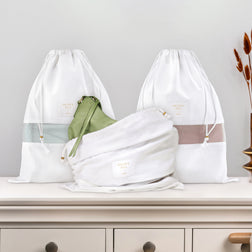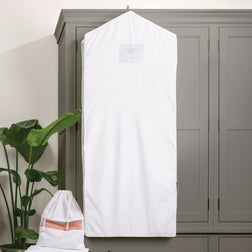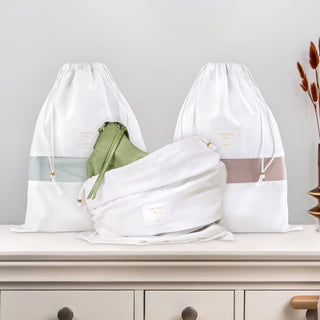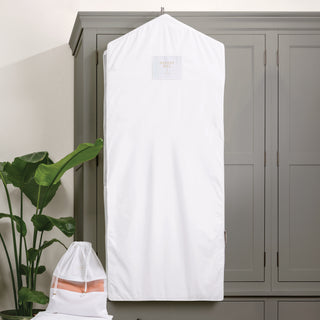There's nothing quite like the smell of freshly laundered clothes to bring a smile to your face. But if you are trying to make more sustainable choices, you may not have considered the negative impact that traditional laundry practices have on the environment.
There's nothing quite like the smell of freshly laundered clothes to bring a smile to your face. But if you are trying to make more sustainable choices, you may not have considered the negative impact that traditional laundry practices have on the environment.
The traditional method for laundering clothes involves high water temperatures, extended wash cycles, machine drying, and laundry detergent in plastic containers. The entire process from stain treatment to ironing accounts for around a fifth of the carbon footprint in the clothing lifecycle.
This lengthy process doesn't benefit your clothes either. It can cause colour fading, shrinkage, and misshaping. As a result, nine out of ten clothing items end up in landfills much sooner than they should.
But, there is another way. Zero-waste laundry is a sustainable alternative to traditional laundering practices.
Though not as commonly known as traditional laundering techniques, zero-waste laundry practices are safer for your health and the environment, and not as overwhelming to implement as you might think.
4 Ways to Transition to Zero-Waste Laundry
Here are four tips to help you transition from conventional to zero-waste laundry.
1. Eco-Friendly Laundry Detergent
Replacing single-use plastics and unneeded chemicals in classic laundry detergents with a zero-waste product is a terrific first step toward a waste-free lifestyle.
The zero-waste label refers to more than just the packaging. After all, several well-known laundry brands sell powdered detergent in compostable cardboard containers. But a recyclable package doesn't make a product sustainable.
Once dissolved, conventional detergents produce microplastics that either end up in the soil, where they never fully degrade, or enter the water supply, harming the environment.
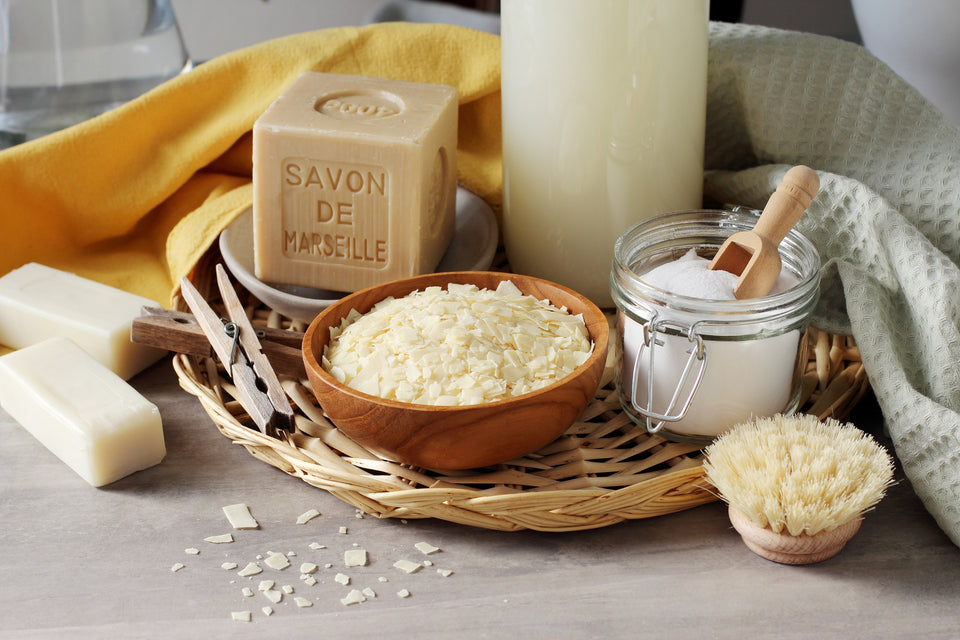
The chemicals and pollutants contained in most laundry detergents also fade the colours of your garments and are more likely to irritate your skin. In fact, several laundry detergents have caused eczema in children and even adults.
Switching to zero-waste laundry detergents is not just better for the environment; it is also better for your skin and your clothes.
Choosing a Natural, Zero-Waste Laundry Detergent
While there are many dye-, perfume-, and plastic-free laundry detergents on the market, natural alternatives to conventional detergents are less known. Three of the best natural detergent options are soap nuts, castile soap, and vinegar.
Soap Nuts
Soup nuts are dried shells of berries, coming from a Himalayan tree, and are a great alternative to laundry soap. These nuts contain saponins, which is a soap-like ingredient that produces a beautiful froth when stirred in warm water.
They are completely natural, chemical-free, and mild. Soap nuts are also antibacterial and antifungal, making them an effective alternative to chemical cleaners.
Castile Soap
This type of soap was developed in the Mediterranean before expanding to Europe. Castile soap is an incredibly versatile vegetable-based soap manufactured without animal fats or synthetic additives.
This natural, biodegradable, nontoxic soap comes in both bar and liquid forms.
Household Vinegar
Another fantastic option for zero-waste laundry is household vinegar. Simply replace standard detergent or fabric softener with a half cup of distilled white vinegar in the washing machine. You can increase the potency by adding some baking soda.
Vinegar will also brighten, whiten, and soften your clothing.

2. Eco-Friendly Fabric Softener
Fabric softeners help to smooth out and restore damaged clothing fibres. They also help to reduce static electricity generated when clothing brushes against each other during the cleaning and drying processes.
Unfortunately, most fabric softeners include dangerous chemicals such as parabens, toluene, and plastic to make the clothes feel softer and smell better. Fortunately, there is an increasing number of environmentally friendly solutions available.
The best zero-waste fabric softeners are:
- plastic-free
- cruelty-free
- derived from natural, biodegradable components
- do not contain perfumes or smells
- use recyclable packaging
- manufactured by companies devoted to sustainable practices
Zero-waste fabric softener options include wool dryer balls and plant-based dryer sheets.
3. Eco-Friendly Water Temperature
Before technological advances in laundry detergent were made, hot water was essential for proper cleaning. However, now you can efficiently clean and wash clothes at considerably lower temperatures.
The primary reason a washing machine requires power is to heat the water. By choosing to wash clothing in warm or cold water, you use significantly less energy.
A washing machine's typical temperature is usually 104°F/40°C. Many machines, however, have the option to lower the temperature to 90°F/30°C. In most circumstances, using a lower temperature will still effectively clean your laundry while conserving resources.
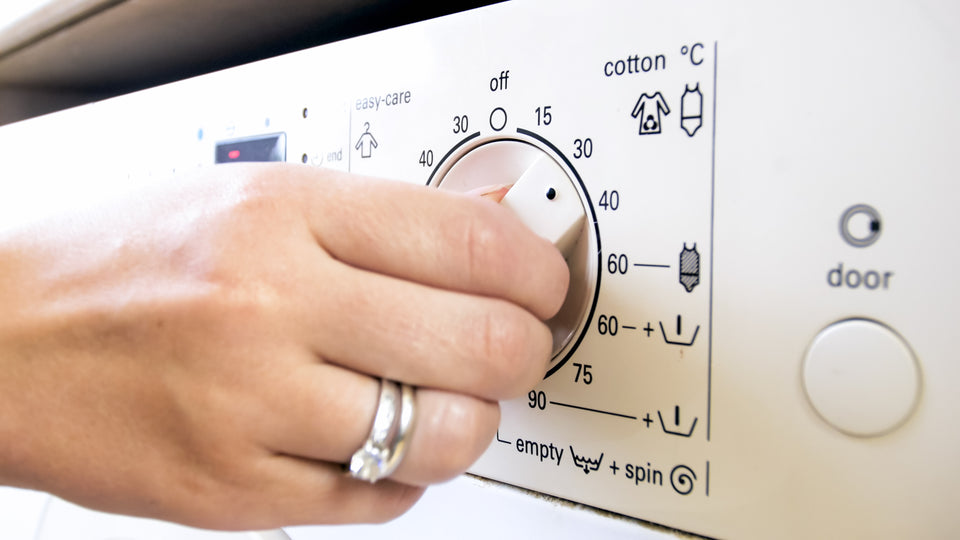
4. Eco-Friendly Clothes Drying
The clothes dryer is a massive energy consumer, and an average load emits up to 1.8kg of CO2. When you consider that the average person dries between 2 and 9 loads each week, the impact soon adds up!
The best zero-waste option is air drying. Hanging clothes to dry is gentler on clothes and conserves energy. However, it is time-consuming and not always possible.
If air drying is not a possibility, consider a heat-pump dryer. But if you have a conventional dryer, here are a few helpful tips to move closer to zero waste.
Lower Temperatures
It might take longer to completely dry a load, but drying clothes at a lower temperature is better for your garments, and it will decrease your carbon footprint.
Stop Using Dryer Sheets
Dryer sheets are most often used to soften clothes, reduce static, and add a pleasant smell. All of those tasks can easily be accomplished by using wool dryer balls sprinkled with a few drops of essential oil.
Use Dryer Balls and a Drying Rack
Dryer balls also do an excellent job of keeping your clothes separated in the dryer, which will help minimise the time your clothes take to fully dry.
Another tool for drying your clothes is a drying rack. The highest quality drying racks are made of metal.

Additional Zero-Waste Laundry Tips
In addition to these four ways to transition to zero-waste laundry, here are a couple of additional pieces of advice that may be helpful on your sustainability journey.
Choose Energy-Efficient Appliances
An energy-efficient washing machine uses less power to wash clothing and results in savings ranging from 25% to 40% or more depending on the model.
It will also cut down on the amount of water you use. A traditional washing machine uses approximately 20 gallons of water per load. A high-efficiency washing machine can cut the amount to 14 gallons or less. Using a less intense wash cycle will also reduce the energy usage of your washing machine.
Only Run Full Loads
Your washing machine will utilise the same amount of energy regardless of how much laundry you load into it. So, only running the washing machine when you have a full load of laundry is a smart way to save water and electricity.
While following a weekly laundry regimen may come naturally to most of us, it might be counterproductive when trying to have a zero-waste home.
FAQ
What is the most environmentally friendly way to wash clothes?
According to one survey, over 60% of people wash their clothes in warm water, even though utilising cold water is the most environmentally beneficial way to wash your clothes. Approximately 75% of the energy consumed for laundry is spent on heating water. So, by using a cold wash, you save electricity on each load. Plastic-bottled laundry soap contributes to pollution as well. Furthermore, as it is packaged in bulky, heavy jugs, it takes up more space in shipping trucks. This contributes to transportation pollution. So, the next most environmentally friendly way to wash your clothes is by using zero-waste detergents.
What’s the most eco-friendly laundry detergent?
Eco-friendly laundry detergents are free of harsh and potentially dangerous chemicals. They usually contain only natural colouring and very little, if any, scents. When shopping, look for products that are phosphate-free, cruelty-free, biodegradable, and packed in recyclable bottles made of recycled plastic. Some will have been approved by reputable environmental organisations such as the Soil Association or the Vegan Society. Consider using a concentrated detergent to save water and energy. And, washing clothes at lower temperatures will conserve energy as well.
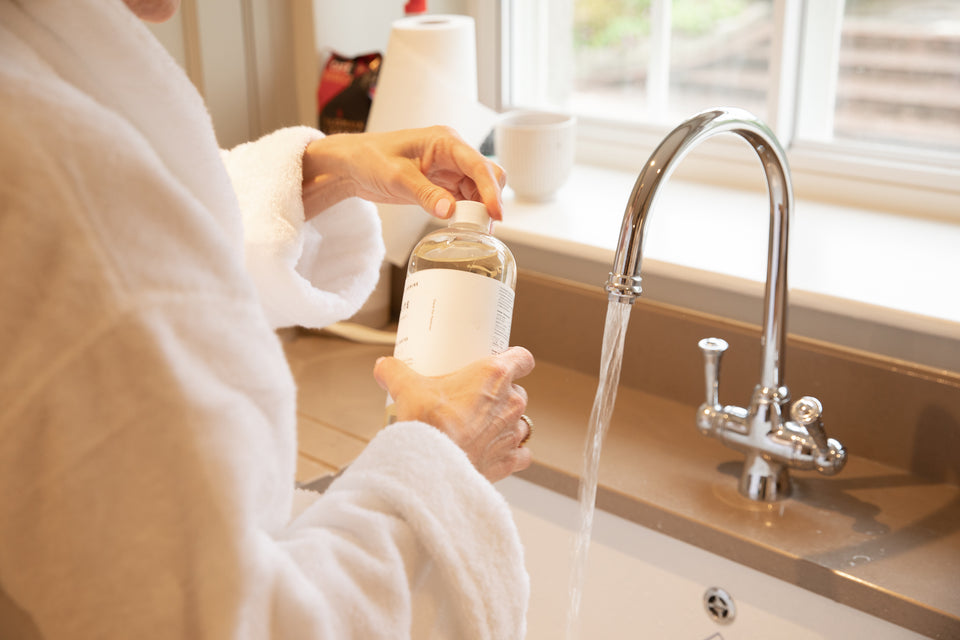
Switching to more sustainable and zero-waste laundry practices may seem overwhelming. However, by evaluating your current routines, replacing conventional with more sustainable goods, and changing your laundry habits, you can significantly lessen your environmental impact.
The advantages of zero-waste practices include only using high-quality, long-lasting products; sending less material to landfills; and exposing yourself to fewer dangerous chemicals.
Even small changes toward a more sustainable life can make a difference and should be applauded.
Hayden Hill is also deeply committed to sustainability. Our long garment bags are made of 100% organic cotton certified through GOTS, which also guarantees the ethical treatment of workers. Hayden Hill delivers sustainable and beautiful garment care to preserve and protect the clothes you love most.
